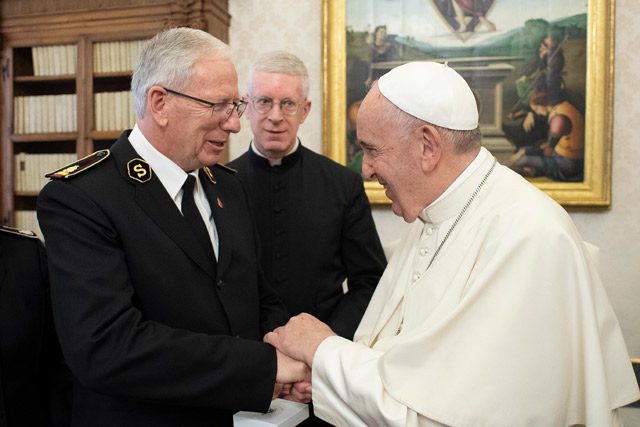$139 million donated to nation’s longest running annual fundraiser
Despite the troubled economy, U.S. donors contributed a record-breaking $139 million The Salvation Army’s Red Kettle campaign, which now includes an increasing Internet presence in addition to traditional kettles and bell ringers. The results were a seven percent increase over 2008’s $130 million record—especially needed as demand for social services skyrocketed. The Salvation Army embraced several new outreach methods in 2009, relying heavily on volunteers, celebrity endorsement and corporate partners for the nation’s longest running annual fundraising campaign.
“America is an incredibly generous nation and philanthropy is alive and well, despite the current economic conditions impacting so many,” said Commissioner Israel L. Gaither, national commander of The Salvation Army. “We are grateful for every donor, volunteer and corporate partner for supporting The Salvation Army’s mission by giving more than ever during a time when some have so little to give.”
The Red Kettle campaign—launched each season on Thanksgiving Day during halftime at the Dallas Cowboys football game—raises money to support the various programs of The Salvation Army that serve more than 28 million Americans each year.
“Our local corps units are reporting demand for social services that is more than 400 percent above normal in some cases,” Gaither said. “We needed help this year and Americans, as well as corporate partners, responded in a big way.”
Hundreds of retailers allowed placement of kettles in front of their stores, including several corporate partners. Those located at Wal-Mart and Sam’s Club stores accounted for as much as 29 percent of the total given. The Walmart Foundation also made a direct donation of $1.25 million to the campaign.
Kroger stores also hosted kettles at nearly 2,000 stores in 2009, raising approximately $11.3 million or eight percent of the campaign’s physical total.
Target continued its support for The Salvation Army by donating more than $1.25 million in the form of cash and in-kind donations during the Christmas season. This year Target collaborated with Hasbro, Inc. for a special promotion whereby Hasbro gave five percent of the purchase price of select Hasbro toys bought exclusively at Target over a one-week period directly to the Army.
In addition to hosting kettles at its stores, JC Penney, in partnership with The Salvation Army, launched the first-ever Online Angel Giving Tree Program, at jcp.com/angel, which allowed individuals to “adopt” Salvation Army “Angels” from across the country and deliver their requested gifts via the Internet.
The Weather Channel promoted a compilation CD featuring a Salvation Army-themed single entitled, “Please Don’t Forget,” performed by Grammy Award winner Aaron Neville.
“Christmas wouldn’t be the same without this element of compassion and charity toward others,” Gaither said. “And, we simply couldn’t help millions of Americans during the season without the support of so many people and organizations.”
The Salvation Army also developed a free application for the Apple iPhone, featuring a virtual Red Kettle bell. More than 59,000 applications were downloaded in 47 countries, allowing users to ring a digital bell in a variety of tones by shaking their phone.
In Detroit, an anonymous donor sponsored, “Coin Catch,” a web-based video game that made micro-donations to the organization based on player’s success. It was available worldwide at: salarmycoincatch.com.
For the fifth year, The Salvation Army empowered donors to raise money with family, friends and colleagues through an Online Red Kettle (onlineredkettle.org), which generated more than $1.9 million, a 100 percent increase over 2008. This amount is in addition to the money raised in physical kettles at retailers. Other online donations in November and December, not through the Online Red Kettle system, totaled $9.6 million, a 5.6 percent increase over the $9.2 million raised in 2008.
Across the Internet, The Salvation Army took advantage of Facebook, Twitter and other popular social networks to promote volunteerism and encourage giving.
“By improving our digital outreach strategy, The Salvation Army is adapting to the changing ways in which people interact,” said Major George Hood, national community relations secretary for The Salvation Army. “The Red Kettles have been a remarkable success for more than a century, and we are building on that for a new generation of donors,” he said.
From a national news release











